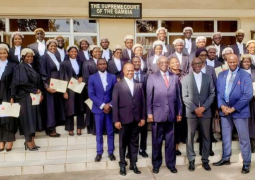
A substantial majority of them bemoaned the profoundly negative impact stigmatisation and marginalisation has had and affects their self-esteem and participation in the classroom and school activities at large.
They also call on government to roll out disability awareness initiatives for students, teachers and staff to increase understanding and empathy, as well as encourage open discussions about disability issues and their impact on individuals and society.
Mamie Mendy, a teacher at St John School for the Deaf, lamented the hardship faced by the children in school.
Ms Mendy relayed that students with speech or hearing impairments find it challenging to communicate with peers, making interactions with their peers often difficult.
An issue of concern among students with disabilities is social isolation, which they experience at greater rates than others. This menace arises from physical barriers, communication difficulties and social attitudes.
Delving into the approach that may help mitigate social isolation, she said: "When teaching students with physical disabilities or intellectual disabilities, schools should include them in mainstream classes as much as possible.
“They should also foster a school culture that encourages diversity and inclusion, educate students and staff on working with students with disabilities, and also provide appropriate support services for students."
A student at the school, Mariama Darboe, expressed that she feels okay being deaf. In a mournful tone, she disclosed that she has six brothers who are equally deaf and they communicate easily.
Delving into the challenges she usually faces, she said: “People will disregard you in the society due to your condition, which could affect our mental health. We faced huge difficulties. Especially during special occasions in the society, people will not inform us about it due to the fact that we are regarded as a result of our disabilities. Sometimes you just wake up and see or hear an event happening without having any knowledge or being informed about it.”
Mariama Baldeh of The Gambia Association of the Deaf and Hard of Hearing (GADHOH) female wing, who doubles as a student at the Gambia College, said disabled students, especially for the deaf, lamented the lack of sign language interpreters in schools which hinders their communication.
She said that during her school days, she would struggle to understand what was being taught, and she appealed to the administration of the schools for sign language interpreter but her efforts proved futile.
Baldeh further explained that during her programs at Gambia College, she personally paid sign language interpreters to help her understand the lectures.
“We want the Government of the Gambia to support deaf education. It is not fair for a deaf person to keep looking for support, and we want to be educated like any other citizen. The education policy says education for all but that is not being fully implemented,” she complained.
Lamin Ceesay, the first vice president of the Gambia Federation for the Disabled, said the government has not provided education resources for students with disabilities, adding that most of the deaf teachers have never undertaken courses.
“Students that are visually impaired lack Braille machine or print paper at the school. The albino students from poor backgrounds cannot afford to buy sun cream lotion on daily basis, which frustrates them to walk under the sun to get proper education,” he explained.
He posited that education helps people to participate in their society and access opportunities but today 99% of deaf students have been trapped below general certificate level, adding that they could obtain neither higher education nor decent employment.
“In fact, it is hard to find a single deaf student among thousands of students attending local universities, which is a clear proof that deaf education has never been given the attention it deserves,” he stated as he called on the authorities to give them a helping hand, especially to learn and contribute to national development.





